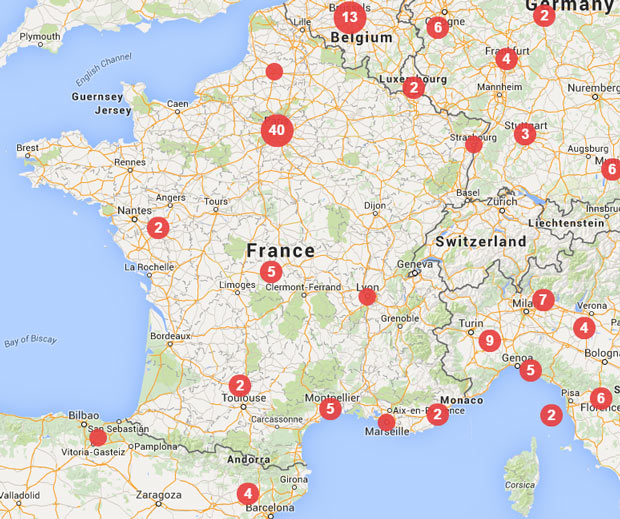Jean-Paul Marthoz: Commercial interference in the European media
[vc_row][vc_column][vc_single_image image=”81193″ img_size=”full” alignment=”center”][vc_column_text]Commercial pressures on the media? Anti-establishment critics have a ready-made answer: of course, journalists are hostage to the whims of corporate owners, advertisers and sponsors. Of course, they cannot independently cover issues which these powers consider “inconvenient”. Actually such suspicion is widely shared: In France, according to the 2017 La Croix barometer on media credibility, 58% of public opinion consider that journalists “are not really able to resist pressures from financial interests”.
The issue is not new. In 1944 when he founded the French “newspaper of record”, Le Monde, Hubert Beuve-Méry fought to guarantee its independence from political parties but also from what he called “the wall of money”. “Freedom of the press belongs to the one who owns one”, New Yorker media critic A.J. Liebling famously said. However, “while media academics have long looked at the question of commercial pressure, ownership (…) in shaping coverage”, writes Anya Schiffrin in a 2017 CIMA report on “captured media” press freedom groups’ focus had been mostly on the governments’ responsibilities and on criminal non-state actors.
In June 2016 Reporters Without Boarders made a splash with its report on oligarchs in the media. Proprietors’ interventions may have indeed a very negative impact on journalism’s proclaimed commitment to report the news without fear or favour. Pressures are particularly acute when the media are owned by conglomerates who dabble in other economic sectors. In France, for instance, a military aircraft manufacturer (Dassault), the luxury industry leader (LVMH), telecoms giants (SFR, Free), a powerful public works and telecoms company (Bouygues) directly own key media companies.
Ownership provides a powerful lever to influence media contents. Cases of direct intervention or of journalists’ self-censorship are not exceptional, even if they are often difficult to prove. In France, Vincent Bolloré, owner, among others, of TV channel Canal+, has been regularly accused of using his powers to determine content. It led the French Senate’s culture commission to invite him to a hearing in June 2016, but he firmly denied all allegations of censorship.
In other European countries, the landscape is much clearer. In Turkey, during the June 2013 Gezi Park events, major TV stations failed to report police repression live. They chose instead to broadcast animal documentaries, for which they were rewarded with the nickname of “penguin media”. In fact, they turned into “proxy censors” for Erdogan’s government who had the power to determine their economic fate by rewarding them -or not- with public works contracts or financial favors. The worst of the worst flourishes in some former communist eastern European countries where major media outlets have been snatched by oligarchs allied with political parties or even, allegedly, with criminal organisations.
Big companies may be ruthless. Advertising budgets can be cut when a media covers “inconvenient news”. In November 2017, according to satirical weekly Le Canard enchainé, Bernard Arnault, the boss of LVMH (luxury products, owner of Le Parisien and Les Echos), canceled his advertising budget in Le Monde until the end of the year after his name appeared in the Paradise Papers global investigation, which named people who had offshore accounts in tax havens. LVMH denied it was cutting all advertising in the paper, adding that it was currently “reflecting on its advertisement policy in classical media”.
The unraveling of the legacy media’s business model has increased their vulnerability to outside pressures. Advertising money is shrinking, therefore increasing the temptation to dismantle what was presented as an impassable wall between “church and state”. Differences between advertising and the news are also being diluted into ambiguous advertorials, sponsored content and “native advertising”.
Such pressures however are not automatic. “Suffering pressures does not mean ceding to them”, says Hervé Béroud, director general of leading all-news TV channel BFMTV. Due to the way journalism actually works, the freedom to report, even against the owners’ interests, cannot be systematically crushed. In fact, as a former editor in chief of Belgian newspapers and magazines I was confronted with radically different forms of “advice” from my successive owners. While some were very protective of editorial independence others were blunter and ready to compromise with advertisers’ “wishes”. The existence of journalists’ societies, co-owners of the so-called “ethical capital” of the paper, provided some protection, but much was left to individual wrestling between the editor and the proprietor.
At the end, this issue comes down to defining who “owns freedom of information”. In 1993 the Parliamentary Assembly of the Council of Europe stated that “the owner of the right is the citizen, who also has the related right to demand that the information supplied by journalists be conveyed truthfully, in the case of news, and honestly, in the case of opinions, without outside interference by either the public authorities or the private sector”. A far cry from A.J. Liebling’s sentence…[/vc_column_text][/vc_column][/vc_row][vc_row][vc_column][vc_custom_heading text=”Survey: How free is our press?” use_theme_fonts=”yes” link=”url:https%3A%2F%2Fwww.indexoncensorship.org%2F2017%2F12%2Fsurvey-free-press%2F|title:Take%20our%20survey||”][vc_separator color=”black”][vc_row_inner][vc_column_inner width=”1/4″][vc_icon icon_fontawesome=”fa fa-pencil-square-o” color=”black” background_style=”rounded” size=”xl” align=”right”][/vc_column_inner][vc_column_inner width=”3/4″][vc_column_text]
Are you a working journalist? Do you want to see better protections and freedoms for reporters?
This survey aims to take a snapshot of how financial pressures are affecting news reporting. The openMedia project will use this information to analyse how money shapes what gets reported – and what doesn’t – and to advocate for better protections and freedoms for journalists who have important stories to tell.
More information[/vc_column_text][/vc_column_inner][/vc_row_inner][vc_separator color=”black”][/vc_column][/vc_row][vc_row][vc_column][vc_custom_heading text=”Don’t lose your voice. Stay informed.” use_theme_fonts=”yes”][vc_separator color=”black”][vc_row_inner][vc_column_inner width=”1/2″][vc_column_text]Index on Censorship is a nonprofit that campaigns for and defends free expression worldwide. We publish work by censored writers and artists, promote debate, and monitor threats to free speech. We believe that everyone should be free to express themselves without fear of harm or persecution – no matter what their views.
Join our mailing list (or follow us on Twitter or Facebook) and we’ll send you our weekly newsletter about our activities defending free speech. We won’t share your personal information with anyone outside Index.[/vc_column_text][/vc_column_inner][vc_column_inner width=”1/2″][gravityform id=”20″ title=”false” description=”false” ajax=”false”][/vc_column_inner][/vc_row_inner][vc_separator color=”black”][/vc_column][/vc_row][vc_row][vc_column][vc_basic_grid post_type=”post” max_items=”12″ style=”load-more” items_per_page=”4″ element_width=”6″ grid_id=”vc_gid:1513691969537-ee852610-8cb0-8″ taxonomies=”8996″][/vc_column][/vc_row]

